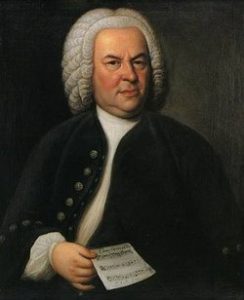 On this glorious day, I am thinking of Bach. Yes, of course Bach. That hero of music, nearly unknown in his lifetime, and eminently legendary ever since; that epitome of greatness in music and innovation. But, do you know what I would like to see? I would like to see more people looking to Bach, not just for interesting performances, done with different instruments in different places, not just homilies and remembrances and endless historical reviews; I would like to see more people looking to Bach for the thing which Bach did best: Composition. Countless times, we have heard of the influence of one great composer on another great composer, but what about this most unique period in history today? We have the advantage, the unspeakable advantage and the almost unheard-of possibilities resulting from the advent of sound equipment and recording technology, thus to be influenced in powerful ways by whatever composer(s) we choose!
On this glorious day, I am thinking of Bach. Yes, of course Bach. That hero of music, nearly unknown in his lifetime, and eminently legendary ever since; that epitome of greatness in music and innovation. But, do you know what I would like to see? I would like to see more people looking to Bach, not just for interesting performances, done with different instruments in different places, not just homilies and remembrances and endless historical reviews; I would like to see more people looking to Bach for the thing which Bach did best: Composition. Countless times, we have heard of the influence of one great composer on another great composer, but what about this most unique period in history today? We have the advantage, the unspeakable advantage and the almost unheard-of possibilities resulting from the advent of sound equipment and recording technology, thus to be influenced in powerful ways by whatever composer(s) we choose!
A man of my acquaintance called our day a day of “Musical Amnesia”. How can it be that in the age of technology, when every effort has been made to put even the most obscure compositions at our disposal, that we have forgotten about this principle of influence?
At an early age, I learned that when I wrote music, it reflected, to a great degree, the music to which I had been listening. I could tailor my compositions with the flick of my wrist, and write in any style I chose, depending on what I was listening to.
Why then, if we love Bach so much, (and there are many who claim to) or Mozart, or Beethoven, or any of them, why then is there not more emulation? Why is it that we hear Bach and Mozart from the Concert Hall in ever tighter concentric circles of elitist performances, yet, from the cutting edge of composition, whether in the University or the Movie Studio, there is an ever deepening black hole of empty show, marked by cheap imitations and knock-offs of half-baked a-tonal pseudo-music?
Where would be the harm in using our technology to influence our writing so that it might reflect the best of the history of this world? We alone have had this capability. And why not use it? Why look to the past only as a relic, to be worshiped from afar? Why not put it into the minds and hearts of our young people in ever more consistent and purposeful ways and let the influence of great teachers have it’s sway?
The best use we can make of Bach, Mozart, Beethoven, Brahms, Vivaldi, Handel, etc. is to let them ‘influence’ our writing. They could be powerful teachers, if we would let them. I am always surprised at how little influence they have had in our Universities. Instead of enlisting these great minds and their music to influence new and upcoming composers, they give them a passing nod, talk about them as though they were dead, (which, of course, they are not!) and direct the student’s minds to the field of exploration of ‘new frontiers’ in music. Leaving the past in the past, they march forward without the guidance of these Masters, only to find that the result is Chaos, Disharmony, Abandonment, Disillusionment, and Despair. As a result, and in spite of the pretenses to the contrary, no one really likes to listen to or support such stuff, but it looks good on paper and it gleans the funds of government grants.
I have lived long enough to see that music has a life of it’s own, in addition to the life of it’s composer. That musical life can be either strong or weak, long or short, simple or complex. The justice of life has decreed that there is some music that lives, and other music that dies. Who would wish to give birth to a child only to have that child die within a short time? No one. By the same token, a composer naturally wishes for his music to outlive him. In order for music to live, it must have life. Perhaps we do not know exactly what quality of the music gives it it’s life. But we do know that Bach and many others were able in some inexplicable way, to tap into that mysterious source and endow their music with it. Bach’s music lives. It just lives. Only a fool would ignore the wisdom of a great teacher when that teacher is willing, able and available.
